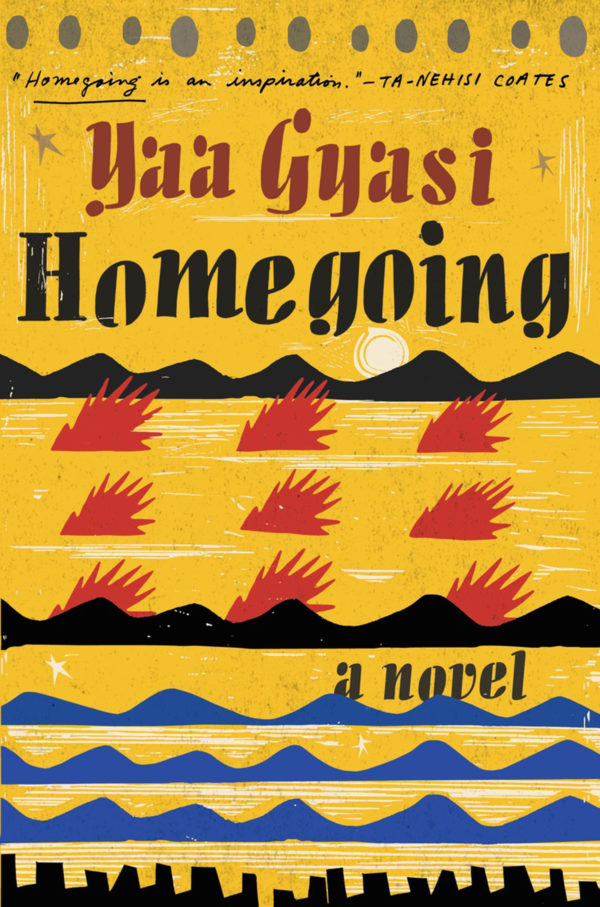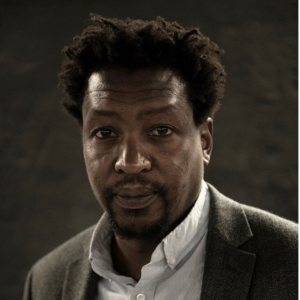In the spring of 2014, G.P. Putnam’s Sons paid a whooping million dollars to acquire Yaa Gyasi’s debut manuscript. The news caused a lot of excitement in the global publishing industry, especially, here in the African literary community.
Gyasi was born in Ghana but grew up predominantly in the US. She was inspired to write Homegoing when she visited a slave fort in Ghana. She wanted to explore the complicity and silences among Africans about what happened during the slave trade.
Homegoing covers over 200 years of historical events that takes us from what is now Ghana to Alabama to Harlem. Critics are loving it! Ta-nehisi Coates calls the novel “an inspiration,” and the NYT review published yesterday had very nice things to say.
The fact that the manuscript sold for that much money is just one of the many reasons we’ve been looking forward to the novel’s official release—which took place today.
Like us, you’re probably asking: what does a million dollar novel read like? Here is your chance to find out! We found this excerpt on Lithub and thought we’d share it.
Enjoy!
***
Tara Singh Carlson, a senior editor at G.P. Putnam’s Sons, said it was “terrifying” when she placed her first-ever million-dollar bid for a book last spring. “It made me want to throw up,” Ms. Carlson said. The book was “Homegoing,” a debut novel by 26-year-old Yaa Gyasi, who was born in Ghana and raised in Alabama. It traces the descendants of two half-sisters born in 18th-century Ghana, covering seven generations and more than 250 years of history—including the Jim Crow era, the Great Migration and the Harlem Renaissance.
“Excuse me, miss. Could you tell me where I am?” he asked. He hadn’t spoken to a woman since the day he called Ethe by another woman’s name.
“You ain’t looked at the sign ’fore you came in?” she asked, smiling. “I reckon I ain’t,” he said.
“You in Pete’s bar, Mr. . . .”
“H is my name.”
“Mr. H is my name.”
They talked for an hour. He found out her name was Dinah and she lived in Mobile but was visiting a cousin there in Birmingham, a very Christian woman who would not care to see her kin drinking. H had just about gotten it into his head to ask her to marry him when another man stepped in to join them.
“You look mighty strong,” the man said.
H nodded. “I s’pose I am.”
“How you got to be so strong?” the man asked, and H shrugged.
“Go on,” the man said. “Roll up yo sleeve. Show us some muscle.”
H started laughing, but then he looked at Dinah, and her eyes were twinkling in that way that said maybe she wouldn’t mind seeing. And so he rolled up his sleeve.
At first, both people were nodding appreciatively, but then the man came closer.
“What’s that?” he said, tugging where the sleeve met H’s back until he’d made a rent in the fabric, and the whole cheap thing tore loose.
“Dear Lord!” Dinah said, covering her mouth.
H craned his neck trying to look at his own back, but then he remembered and knew he didn’t need to. It had been nearly twenty five years since the end of slavery, and free men were not supposed to have fresh scars on their backs, the evidence of a whip.
“I knew it!” the man said. “I knew he was one of them cons from over at the mines. Ain’t nothin’ else he could be! Dinah, don’t you waste any more time talking to this nigger.”
She didn’t. She walked away with the man to stand on the other side of the bar. H rolled his sleeve back down and knew that he couldn’t go back to the free world, marked as he was.
He moved to Pratt City, the town that was made up of ex-cons, white and black alike. Convict miners who were now free miners. His first night there, he asked around for a few minutes until he found Joecy, along with his wife and children, who had moved out to Pratt City to be with him.
“Ain’t you got no one?” Joecy’s wife said, frying up some salt pork for H, working hard to make up for the fact that he had not eaten a good meal for ten years, maybe more.
“Had a woman named Ethe, long time ago, but I reckon she ain’t gon’ wanna hear from me now.”
The wife gave him a piteous look, and H figured she was thinking she knew the whole story of Ethe, having married a man herself before the white man came and labeled him con.
“Lil Joe!” the wife called, over and over, until a child appeared. “This our son, Lil Joe,” she said. “He know how to write.”
H looked him over. He couldn’t have been more than eleven years old. He was knobby-kneed and clear-eyed. He looked just like his father, but he was different too. Maybe he wouldn’t end up the kind of man who needed to use his body for work. Maybe he’d be a new kind of black man altogether, one who got to use his mind.
“He gon’ write yo woman,” the wife said.
“Naw,” H said, thinking about how Ethe had fled the room the last time they were together, fled like a spirit was chasing her. “Ain’t no need.”
The wife clucked her tongue twice, three times. “I ain’t gon’ hear none of that,” she said. “Somebody gotta know you free now. Somebody in this world need to know at least that.”
“With all due respect, ma’am. I got myself, and that’s all I ever needed.”
Joecy’s wife looked at him long and hard, and H could see all the pity and anger in that look, but he didn’t care. He didn’t back down, and so, finally, she had to.
The next morning, H walked with Joecy over to the mine to ask for work as a free laborer.
The boss man was called Mr. John. He asked H to take off his shirt. He inspected the muscles on his back and on his arms, and whistled.
“Any man what can spend ten years working at Rock Slope and live to tell about it’s worth a-watching.
Made some deal with the devil, have you?” Mr. John asked, looking at H with his piercing blue eyes.
“Just a hard worker, sir,” Joecy said. “Hard and smart, too.” “You vouch for him, Joecy?” Mr. John asked.
“Ain’t none better but me,” Joecy said.
H left with a pick in his hands.
Pratt City life was not easy, but it was better than the living H had known anywhere else. He had never seen anything like it before. White men and their families next door to black men and theirs. Both colors joining the same unions, fighting for the same things. The mines had taught them that they had to rely on each other if they wanted to survive, and they had taken that mentality with them when they started the camp because they knew no one but a fellow miner, a fellow ex-con, knew what it was like to live in Birmingham and try to make something of a past that you would sooner forget.
The work H did was the same, only now he got paid for it. Proper wages, for he had once been a first-class man, contracted by coal companies from the state prison for nineteen dollars a month. Now that money went into his own pocket, sometimes as much as forty dollars in a single month. He remembered what little he had saved sharecropping for two years at the Hobbs plantation, and he knew that in some dark and twisted way the mine was one of the best things that had happened to him. It taught him a new skill, a worthy one, and his hands would never have to pick cotton or till land ever again.
Joecy and his wife, Jane, had been gracious enough to let H move in with them, but H had tired of living off of and around other people and their families. So he spent the better part of his first month in Pratt City coming back from the mine and then heading straight to the plot of land next to Joecy’s place to start building his own house.
H was out there one night, hammering wood, when Joecy came to see him.
“Why ain’t you joined the union yet?” Joecy asked. “We could use somebody with your temper.”
He had gotten good lumber from another old friend from the mine and the only time he could work on building the house was between 8:00 p.m. and 3:00 a.m. At every other waking hour, he was down in the mines.
“I ain’t like that no more,” H said. Though he had no scar on his neck from that day the pit boss had sliced him, he still ran his hands there from time to time as a reminder that a white man could still kill him for nothing.
“Oh you ain’t like that, huh? C’mon, H. We fightin’ for things that you could use too. Ain’t like you got anybody to keep you company in this here house you buildin’. Union might do you some good.”
H sat in the very back of the first meeting he ever went to, his arms folded. At the front of the room a doctor spoke to them about black lung disease.
“The mineral dust that covers the outside of your bodies when you leave, well, that gets inside your body too. Makes you sick. Shorter hours, better ventilation, those are things that you should be fighting for.”
It had taken about a month, but it wasn’t just Joecy’s talk that finally convinced H to join. The truth was, he was scared of dying in the mines and his freedom had not erased his fear. Every time H was lowered down into the mine, he would picture his own death. Men were getting diseases he had never before seen or heard of, but now that he was free he could make the danger worth something.
“More money’s what we should be fighting for,” H said.
A murmur started to pass through the room as people craned their necks to see who had spoken. “Two-Shovel H is here,” “Is that Two-Shovel?” He’d gone so long without attending a meeting.
“Ain’t no way to keep from breathing the dust, doc,” H said. “Hell, most the men in this room are halfway to death as it is. Might as well get paid ’fore we go.”
Behind H, the meeting door started to rustle and a child who’d had his leg blown off hobbled in. He couldn’t have been more than fourteen years old, but already, H felt like he could picture the entire course of that boy’s life. Maybe he’d started out as a breaker, sitting hunched over tons of coal, trying to separate it from slate and rock. Then maybe the bosses moved him up to spragger because they saw him running outside one day and knew that he was fast. The boy had to run along the cars, jamming sprags in the wheels to slow the cars down, but maybe one car didn’t slow down. Maybe that one car jumped the track and took the boy’s leg and his whole future with it. Maybe what saddened the boy most after the doctor sawed it off was the fact that he wouldn’t ever get to be a first-class miner like his father.
The doctor looked from H to the crippled boy and back again. “Money’s nice, don’t get me wrong. But mining can be a whole lot safer than what it is. Lives are worth fighting for too.” He cleared his throat, then continued to speak about the signs of black lung.
On his walk home that night, H started to think about the crippled boy, how easy it had been for H to make up his story. How easy it was for a life to go one way instead of another. He could still remember telling his cellmate that nothing could kill him, and now he saw his mortality all around him. What if H hadn’t been so arrogant when he was a younger man? What if he hadn’t been arrested? What if he’d treated his woman right? He should have had children of his own by now. He should have had a small farm and a full life.
Suddenly H felt like he couldn’t breathe, like that decade’s worth of dust was climbing up his lungs and into his throat and choking him. He hunched over and started to cough and cough and cough, and when he’d finished coughing, he stumbled his way to Joecy’s house and knocked on the door.
Lil Joe answered with sleep in his eyes. “My daddy ain’t back from the meeting yet, Uncle H,” he said.
“I ain’t here to see your daddy, son. I—I need you to write me a letter. Can you do that?”
Lil Joe nodded. He went into the house and came back out with the supplies he needed. He wrote as H dictated:
Deer Ethe. This is H. I am now free an livin in Prat City.
H mailed the letter the very next morning.
* * * *
“What we need to do is call a strike,” a white union member said.
H was sitting in the front row of the church house where the union meetings were held. There was an endless list of problems and the strike was the first solution. H listened carefully as a murmur of agreement began to rush through the room, as hushed as a hum.
“Who gon’ pay attention to our strike?” H asked. He was becoming more vocal at the meetings.
“Well, we tell ’em we won’t work until they raise our pay or make it safer. They gotta listen,” the white man said.
H snorted. “When a white man ever listened to a black man?” “I’m here now, ain’t I? I’m listening,” the white man said.
“You a con.”
“You’re a con, too.”
H looked around the room. There were about fifty men there, over half of them black.
“Whatchu done wrong?” H asked, returning his gaze to the white man.
At first, the man wouldn’t speak. He kept his head lowered, and cleared his throat so many times, H wondered if there was anything left in his mouth at all. Finally the words came out. “I killed a man.”
“Killed a man, huh? You know what they got my friend Joecy over there for? He ain’t cross the street when a white woman walk by. For that they gave him nine years. For killin’ a man they give you the same. We ain’t cons like you.”
“We gotta work together now,” the white man said. “Same as in the mine. We can’t be one way down there and another way up here.”
No one spoke. They all just turned to watch H, see what he would say or do. Everyone had heard the story of the time he’d picked up that second shovel.
Finally he nodded, and the next day the strike began.
Only fifty people showed up on that first day. They gave their bosses a list of their demands: better pay, better care for the sick, and fewer hours. The white union members had written up the list, and Joecy’s boy, Lil Joe, had read it aloud to all the black members to make sure it said what they thought it said. The bosses had answered back that free miners could easily be replaced by convicts, and one week later a carriage full of black cons appeared, all under the age of sixteen, and looking so scared it made H want to quit the strike if only it meant more people wouldn’t be arrested to fill in the gap. By the end of the week, the only thing both sides had agreed to was that there would be no killing.
And still, more convicts were rounded up and brought in. H wondered if there was a black man left in the South who hadn’t been put in prison at one point or another, so many of them came to fill the mines. Even free laborers who weren’t striking were being replaced, so soon more of them joined in the fight. H spent hours at Joecy and Jane’s house, making signs with Lil Joe.
“What that say?” H asked, pointing to the tar-painted wood at Lil Joe’s side.
“It say, more pay,” the boy answered.
“And what that say?”
“It say, no more tuberculosis.”
“Where you learn to read like that?” H asked. He had grown so fond of Lil Joe, but the sight of his friend’s son only made him ache for a child of his own.
The smell of the tar Lil Joe was using to write clung to the hairs in H’s nostrils. He coughed a little and a black string of mucus trailed from his mouth.
“I had a little school in Huntsville ’fore they took my daddy. When they arrested him, they said he and my whole family was gettin’ too uppity. They said that was why Daddy didn’t cross the street when the white woman passed by.”
“And what you think?” H asked.
Lil Joe shrugged.
The next day, Joecy and H took the signs out with them to the strike. There were about 150 men standing out in the cold. They all watched while the new crop of cons walked by, waiting to be lowered down into the mines.
“Let them kids go!” H shouted loudly. A boy had peed himself waiting for the shaft, and H suddenly remembered the one who had been chained to him as they rode the train over, who had wet himself and cried endlessly when they stood before the pit boss. “They ain’t but kids. Let ’em go!”
“Are you gonna stop this foolishness and get back to work?” came the reply.
Then, suddenly, the boy who had wet himself started to run. He was nothing but a blur in the corner of H’s eye before the gunshot went off.
And the people on strike broke the line, swarming the few white bosses who were standing guard. They broke the shafts and dumped the coal from the tramcars before breaking those too. H grabbed a white man by the throat and held him over the vast pit.
“One day the world gon’ know what you done here,” he said to the man, whose fear was written plainly across his blue eyes, bulging now that H’s grip had tightened.
H wanted to throw the man down, down to meet the city underneath the earth, but he stopped himself. He was not the con they had told him he was.
* * * *
It took six more months of striking for the bosses to give in. They would all be paid fifty cents more. The running boy was the only one to die in the struggle. The pay increase was a small victory, but one that they would all take. After the day the running boy died, the strikers helped clean up the mess the fight had made. They picked up their shovels, found the boy who’d been gunned down, and buried him in the potter’s field. H wasn’t sure what the others were thinking when they finally laid the boy to rest among the hundreds of other cons who had died there, nameless, but he knew that he was thankful.
After the union meeting where the raise was announced, H walked home with Joecy. He saw his friend off to his house, and then he went next door to his own. When he got there, he saw that his front door was swinging open, and a strange smell was coming from inside. He still had his pick on him, caked with the dirt and coal from the mine. He lifted the pick over his head, certain that a pit boss had come to meet him. He crept in lightly, ready for whatever came next.
It was Ethe. Apron tied around her waist and handkerchief wrapped around her head. She turned from the stove, where she was cooking greens, and faced him.
“You might as well set that thing down,” she said.
H looked at his hands. The pick was raised, just slightly, above his head, and he lowered it to his side and then to the floor.
“I got your letter,” Ethe said, and H nodded and the two of them just stood there and stared at each other for a moment before Ethe found her voice again.
“Had to get Miz Benton from up the street to read it fo’ me. First, I just let it sit there on my table. Every day, I would pass it, and I’d think ’bout what I was gon’ do. I let two months go by that way.”
The fatback at the bottom of the pot started to crackle. H didn’t know if Ethe could hear it because she had not looked away from him, nor he from her.
“You have to understand, H. The day you called me that woman’s name, I thought, Ain’t I been through enough? Ain’t just about everything I ever had been taken away from me? My freedom. My family. My body. And now I can’t even own my name? Ain’t I deserve to be Ethe, to you at least, if nobody else? My mama gave me that name herself. I spent six good years with her before they sold me out to Louisiana to work them sugarcanes. All I had of her then was my name. That was all I had of myself too. And you wouldn’t even give me that.”
Smoke began to form above the pot. It rose higher and higher, until a cloud of it was dancing around Ethe’s head, kissing her lips.
“I wasn’t ready to forgive you that for a long time, and by the time I was, the white folks was already payin’ you back for somethin’ I know you ain’t done, but nobody would tell me how I could get you out. And what was I s’posed to do then, H? You tell me. What was I s’posed to do then?”
Ethe turned away from him and went to the pot. She began scraping the bottom of it, and the stuff she lifted up with the spoon was about as black as anything H had ever seen.
He went to her, took her body in his arms, let himself feel the full weight of her. It was not the same weight as coal, that mountain of black rock that he’d spent nearly a third of his life lifting. Ethe did not submit so easily. She did not lean back into him until the pot had been scraped clean.










Read an Excerpt of Yaa Gyasi’s $1-Million Debut Novel – Creative Writing News June 10, 2016 08:58
[…] Like us, you’re probably asking: what does a million dollar novel read like? Here is your chance to find out! Read an excerpt here Lithub […]